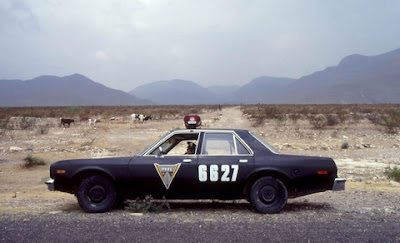El patrullero
 Alex Cox is another director (and another European) who, like Werner Herzog and Mika Kaurismäki, is obsessed by Latin America. He made Walker, perhaps the best and most inventive take on the Central American revolutions; Straight to Hell, a one of a kind spaghetti Western; Death and the Compass, an adaptation of a Borges short story; and with El patrullero (Highway Patrolman) he takes the decidedly unusual stop of seeking to direct what is effectively a Mexican movie.
Alex Cox is another director (and another European) who, like Werner Herzog and Mika Kaurismäki, is obsessed by Latin America. He made Walker, perhaps the best and most inventive take on the Central American revolutions; Straight to Hell, a one of a kind spaghetti Western; Death and the Compass, an adaptation of a Borges short story; and with El patrullero (Highway Patrolman) he takes the decidedly unusual stop of seeking to direct what is effectively a Mexican movie.The film's cast and crew are all Mexican (barring a brief cameo that features Cox himself as a gringo in a bar), the dialogue is in Spanish, and the film's concerns are recognizably Mexican. Its tale of a public official who slides slowly but inevitably from naïve idealism to increasing corruption mirrors for example La Ley de Herodes, in which Cox also had a small part. The two films also have a rather similar visual aesthetic. But similar concerns can also be found in the otherwise very different Argentine film El bonaerense, a rather grittier account of a policeman's journey from cadet to cynical veteran of a corrupt and corrupting system. Cox (or rather his cinematographer Miguel Garzón) employs languid but unobtrusive long shots rather than frantic camera movement and sharp editing, so his is a more detached and understated version of realism. And perhaps this detachment is an indication that the film-maker is ultimately an outsider to the environment he's depicting. Even so, we never lose sympathy for the protagonist, Pedro Rojas, whose worst crime is to have unrealizable good intentions.
And the theme of frustrated good intentions is also key to the film's allegorical reading. For Cox and screenwriter Lorenzo O'Brien are burnt by their experience making Walker, a film they thought could intervene politically into the debate about US intervention in Central America, but which they found ignored or reviled by the industry establishment and he media alike. So El patrullero is as much an indictment of the cinema, or rather a bittersweet reflection on the medium's possibilities and disappointments, as it is a story about the Mexican highway police. At one point in the movie Rojas returns home late at night to find his father-in-law snoozing in front of the television. The film that's shown on the set is Robocop 2, a film Cox was once asked to direct, though he turned it down. The point is both that Pedro Rojas is no Robocop, and also that even blockbuster movies ultimately have little effect if in the end the audience close their eyes.

Article Link: David Laderman, "The Road Movie Rediscovers Mexico: Alex Cox's 'Highway Patrolman.'" Cinema Journal 39.2 (Winter 2000): 74-99.
